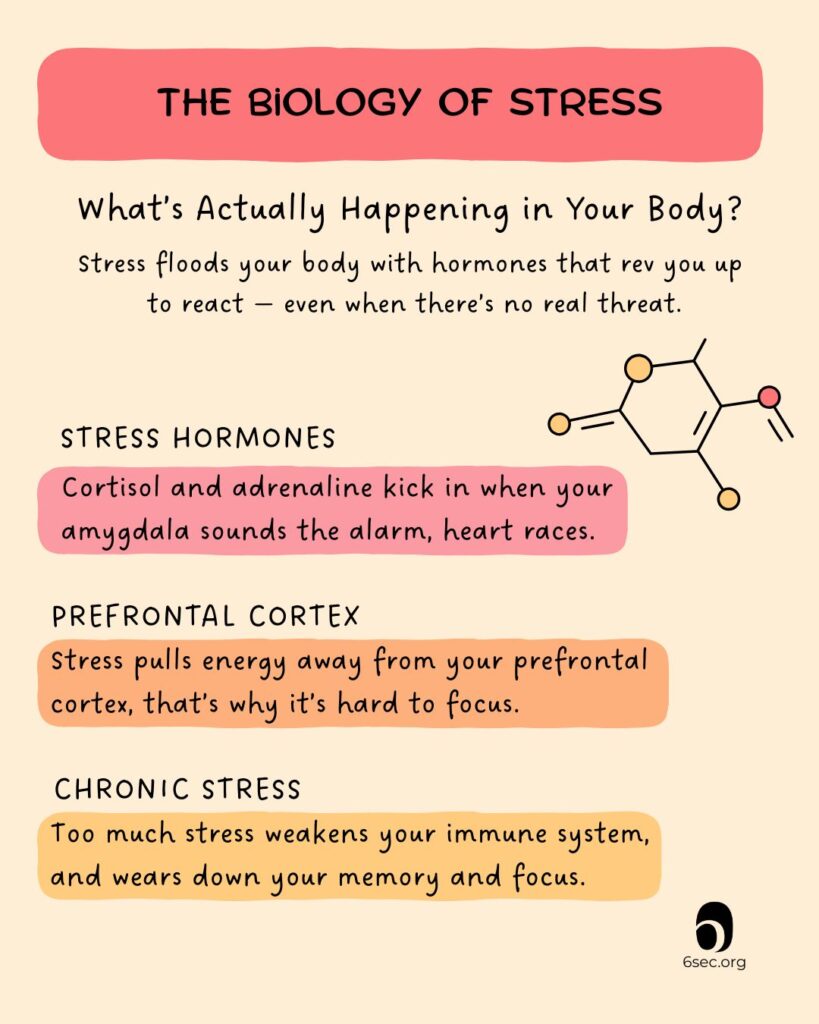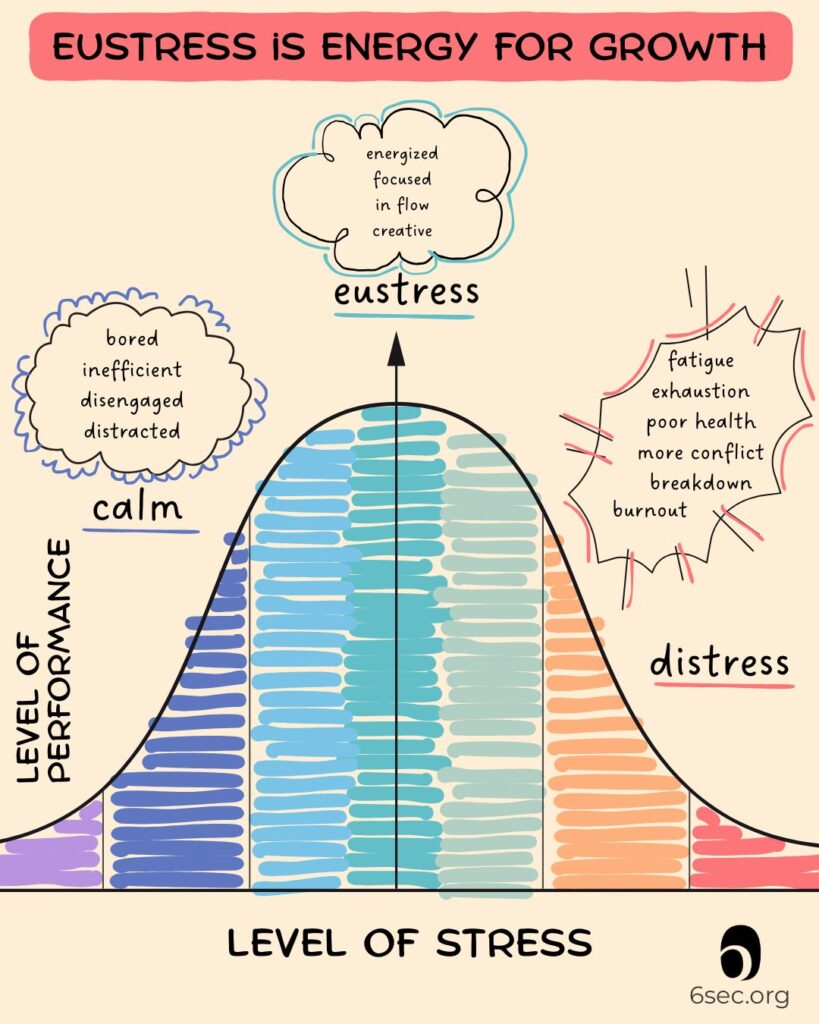How to Make Stress Work for You
Rethink your relationship with stress using emotional intelligence tools. Discover how to reframe stress, reduce reactivity, and reconnect with what matters most.
by Patty Freedman

We’ve been taught that stress is harmful; it drains our energy, shortens our lifespan, and harms our relationships. But the truth is perhaps more nuanced and more hopeful.
In The Upside of Stress, psychologist Kelly McGonigal introduced a radical idea:
“It’s not just the amount of stress we experience. It’s how we think about it that determines its impact.”
Her research showed that when people believed stress was harmful, it was. But those who experienced high stress and believed it was helpful were more resilient, more engaged, and even healthier.
Check out our spotlight on her research in “A User’s Guide to Stress.”
Since that discovery, research on the stress mindset has grown. These findings show that stress can actually support growth and motivation when we respond to it with awareness and emotional intelligence.
Stress Isn’t the Problem.
It’s a Signal.
Stanford psychologist Alia Crum studies how mindsets affect human behavior and health outcomes. Her research shows that the way we perceive stress changes how our bodies and brains respond. When we see stress as a challenge, not a threat, we activate brain systems related to learning and resilience. Stress can actually help us focus and rise to the moment.
Watch Dr Crum’s TEDx talk on how our stress beliefs shape biology and behavior.
“Stress is a wake-up call. When we reframe it, we unlock motivation and growth.”
The Brain’s Response to Stress
When we encounter a stressful situation, our brain’s prefrontal cortex, responsible for planning, behavior, and cognition, signals our adrenal system to release cortisol, the primary stress hormone. Cortisol prepares the body to respond to immediate challenges by increasing heart rate, elevating blood pressure, and redirecting energy to systems essential for survival. If you’re alone in the savanna trying to avoid a lion, you want to have cortisol onboard to help you stay vigilant.
While this stress response helps us in the short term, sustained or chronic stress has a very different effect.
A sustained increase in cortisol leads to more cortisol receptors being produced in brain cells. This causes structural changes, such as the shrinking of dendrites, the branches that help brain cells communicate. In effect, stress doesn’t just change how we feel. It physically alters the brain.

A key study by Chetty et al. (2014) found that prolonged stress creates hardwired connections between the hippocampus (which processes memory) and the amygdala (which processes threat and emotion). This hardwiring results in the brain remaining on high alert, even when no actual danger is present, a state often referred to as “chronic fight-or-flight.”
This can manifest in daily life as hypervigilance and reactivity. In the workplace, it may look like constantly putting out fires, making quick, short-term decisions, and struggling to shift into strategic or creative thinking.
The same study also found that sustained stress impairs the conversion of stem cells into neurons and disrupts their connection to the prefrontal cortex. Over time, this can negatively impact memory, decision-making, and emotional regulation.
These effects make it even more critical to build skills and routines that allow us to pause, reframe, and reconnect so we can counteract the effects of chronic stress.
It’s important for us to take preventative action to reduce our elevated level of stress and re-engage our brain’s higher functions through mindfulness exercises, physical exercises, taking a break, doing something that supports your wellbeing.
“When stress rewires the brain, we stop responding. We start reacting.”
Want more emotional intelligence support for stress?
Sign up to get this free Mini-Toolkit for Wellbeing: “Make Stress Work for You”. You’ll get five emotional intelligence practices to help you shift your stress mindset and use stress to your advantage.
Good Stress Fuels Growth
There is a form of stress that benefits us. Known as eustress, this is the kind of pressure you feel when starting something new or tackling a challenge that matters. It increases alertness and helps you focus, making it a catalyst for positive change.
When you’re just beyond your comfort zone, your brain is primed for learning and emotional growth. This is where emotional intelligence competencies such as Exercise Optimism and Navigating Emotions come into play. These skills help you make thoughtful choices and stay present, even when the pressure rises.
The trick of course is to learn to recognize the “sweet spot” for you to reach eustress zone. Try journaling in your daily schedule times of day (or tasks) that felt most motivating, exciting, challenging for you. When were you feeling the extra push from eustress? When were you feeling too relaxed or in a “calm”, disengaged state? These phases can be more challenging for us to recognize than the “distress” state because we are so familiar with that frazzled feeling.

Stress Connects Us to Others
One surprising benefit of stress is that it motivates connection. During stress, your brain releases oxytocin, a hormone that promotes trust and connection. This “tend and befriend” response helps us seek support and strengthens social bonds.
Instead of isolating under stress, we can harness this built-in hormonal response and use it as an opportunity to connect. A simple conversation can restore emotional balance and deepen trust. Emotional intelligence skills like empathy and active listening are key skills to exercise.
“Oxytocin is your body’s invitation to reach out. Stress makes us social for a reason.”
Stress Can Shrink Our Thinking Unless We Pause
Under stress, your brain switches to short-term survival mode. The prefrontal cortex, responsible for planning and long-term thinking, becomes less active. Meanwhile, your reactive brain, the amygdala, takes over.
This is why we often make impulsive (and often short-term) decisions during high-stress moments. We become focused on immediate relief, rather than long-term values and outcomes.
One of the most important things you can do during stress is to pause and reconnect with your Noble Goal. This Six Seconds competency encourages us to reflect on our deeper purpose before acting.
Ask yourself:
“Will this decision support my long-term purpose, or is it just a quick fix for a short-term problem?”
Reconnecting with your Noble Goal restores clarity and gives you access to higher-level thinking.
“Stress makes us reactive. Purpose makes us intentional.”
Tools to Deepen This Practice
Try these two tools from Six Seconds to make stress awareness and emotional intelligence more tangible:
- Think Feel Act Cards: Help people distinguish between thoughts, feelings, and actions to make clearer choices.
- Evoke Metaphor Cards: Use image-based storytelling to explore how you experience stress and how you want to respond to it.
Stress doesn’t have to derail you. With the right tools, it becomes a compass pointing to your purpose.
Reframe Stress to Reclaim Your Power
Stress is a biological reality, but it doesn’t have to control us. When we shift our stress mindset, understand the neuroscience of stress, and apply emotional intelligence skills, we gain a powerful advantage.
Instead of being hijacked by reactivity, we can respond with clarity. Instead of burning out, we can find purpose and direction. Stress can be the moment we check in—not check out. It can become the signal to realign with what matters most. The question is not how to eliminate stress entirely. The real opportunity is learning how to make stress work for you.
Want to take the next step? Download the Stress Toolkit (see form above) and begin transforming your stress into strength today.

For more articles, I recommend:
- Is Your Motivation Hiding? Shine a Light on It - February 3, 2026
- Six Seconds 2025 Impact Report: Global reach, measurable outcomes anda growing movement for emotional intelligence - January 2, 2026
- The Holidays Can Be Something We Make, Not Something We Survive - December 7, 2025
